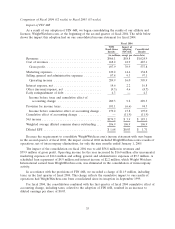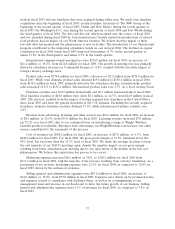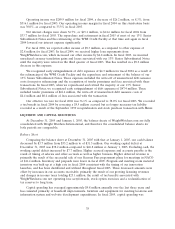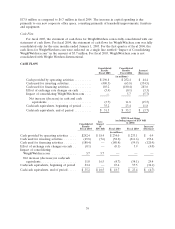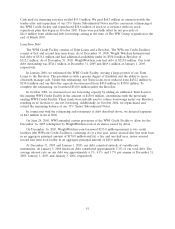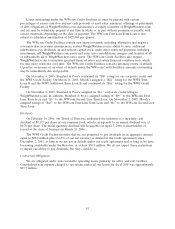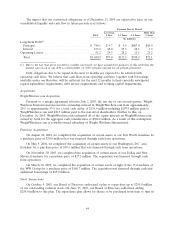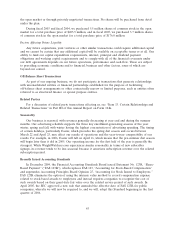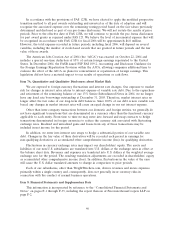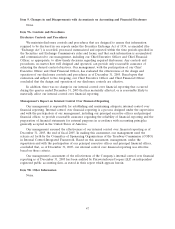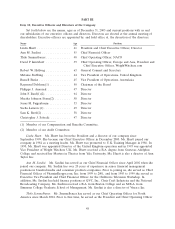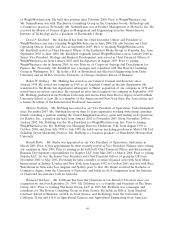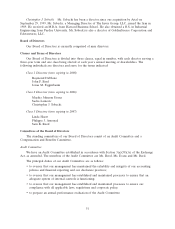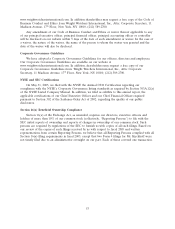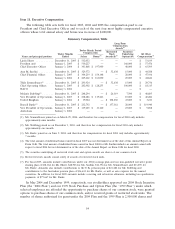WeightWatchers 2005 Annual Report Download - page 55
Download and view the complete annual report
Please find page 55 of the 2005 WeightWatchers annual report below. You can navigate through the pages in the report by either clicking on the pages listed below, or by using the keyword search tool below to find specific information within the annual report.the open market or through privately negotiated transactions. No shares will be purchased from Artal
under the plan.
During fiscal 2003 and fiscal 2004, we purchased 5.5 million shares of common stock in the open
market for a total purchase price of $205.9 million, and in fiscal 2005, we purchased 3.7 million shares
of common stock in the open market for a total purchase price of $176.0 million.
Factors Affecting Future Liquidity
Any future acquisitions, joint ventures or other similar transactions could require additional capital
and we cannot be certain that any additional capital will be available on acceptable terms or at all. Our
ability to fund our capital expenditure requirements, interest, principal and dividend payment
obligations and working capital requirements and to comply with all of the financial covenants under
our debt agreements depends on our future operations, performance and cash flow. These are subject
to prevailing economic conditions and to financial, business and other factors, some of which are
beyond our control.
Off-Balance Sheet Transactions
As part of our ongoing business, we do not participate in transactions that generate relationships
with unconsolidated entities or financial partnerships established for the purpose of facilitating
off-balance sheet arrangements or other contractually narrow or limited purposes, such as entities often
referred to as structured finance or special purpose entities.
Related Parties
For a discussion of related party transactions affecting us, see ‘‘Item 13. Certain Relationships and
Related Transactions’’ in Part III of this Annual Report on Form 10-K.
Seasonality
Our business is seasonal, with revenues generally decreasing at year end and during the summer
months. Our advertising schedule supports the three key enrollment-generating seasons of the year:
winter, spring and fall, with winter having the highest concentration of advertising spending. The timing
of certain holidays, particularly Easter, which precedes the spring diet season and occurs between
March 22 and April 25, may affect our results of operations and the year-to-year comparability of our
results. For example, in 2006, Easter will fall on April 16, which means that the pre-summer diet season
will begin later than it did in 2005. Our operating income for the first half of the year is generally the
strongest. While WeightWatchers.com experiences similar seasonality in terms of new subscriber
signups, its revenue tends to be less seasonal because it amortizes subscription revenue over the related
subscription period.
Recently Issued Accounting Standards
In December 2004, the Financial Accounting Standards Board issued Statement No. 123R, ‘‘Share-
Based Payment’’ (‘‘FAS 123R’’), which replaces FAS 123, ‘‘Accounting for Stock-Based Compensation’’
and supersedes Accounting Principles Board Opinion 25, ‘‘Accounting for Stock Issued to Employees.’’
FAS 123R eliminates the option of using the intrinsic value method to record compensation expense
related to stock-based awards to employees and instead requires companies to recognize the cost of
such awards based on their grant-date fair value over the related service period of such awards. In
April 2005, the SEC approved a new rule that amended the effective date of FAS 123R for public
companies, whereby we will now be required to, and we will, adopt this Standard beginning in the first
quarter of 2006.
45


